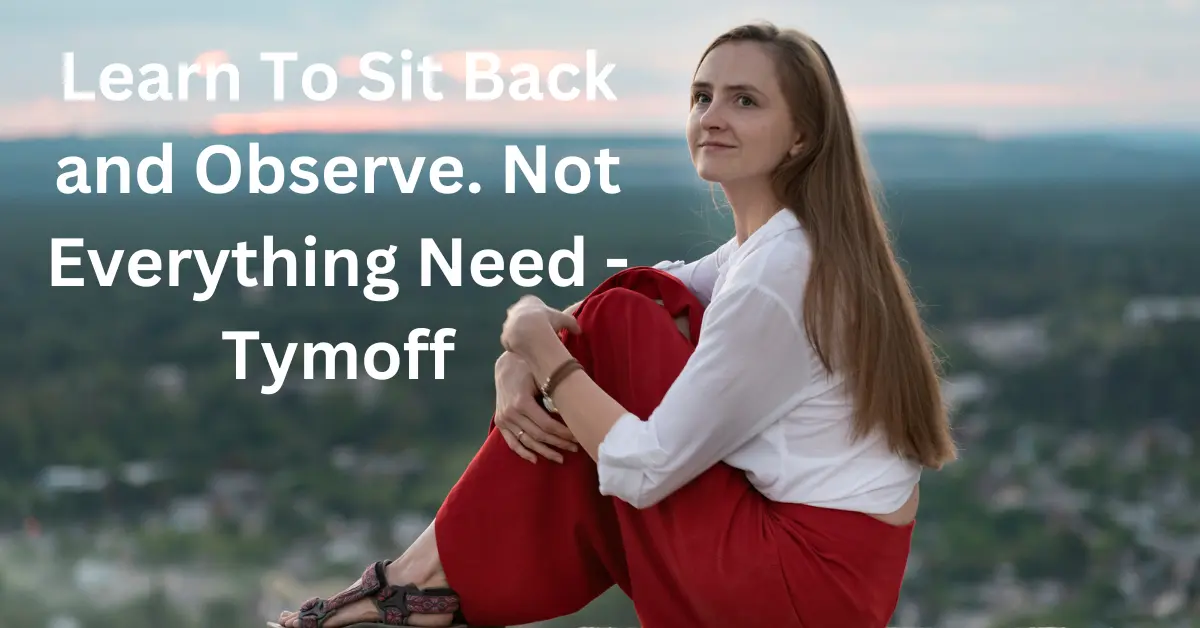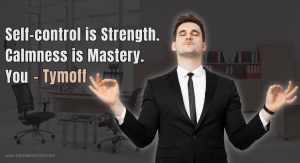In our fast-paced world, we often feel compelled to act immediately, solve every problem, and respond to every situation. However, there’s a profound wisdom in the ability to sit back and observe, to understand that not everything needs your intervention. This concept is encapsulated in the phrase, Learn to sit back and observe. Not everything needs your action – Tymoff. By embracing this philosophy, we can cultivate patience, mindfulness, and better decision-making skills. This article delves into the importance of observation, the benefits of non-intervention, and practical ways to incorporate this mindset into your daily life.
The Art of Observation
Why Observation Matters
Observation is a critical skill that allows us to understand our environment, the people around us, and the dynamics of different situations. It involves attentively noticing details and patterns without rushing to judgment or action. By observing, we gather valuable information that can lead to more informed and thoughtful responses.
Cultivating Patience Through Observation
Patience is a virtue often overlooked in today’s society, where instant gratification is the norm. Learning to sit back and observe cultivates patience. It teaches us to wait for the right moment to act, ensuring that our actions are more effective and meaningful. When we observe, we allow situations to unfold naturally, which can lead to better outcomes.
The Benefits of Non-Intervention
Avoiding Unnecessary Stress
One of the key benefits of non-intervention is the reduction of stress. When we feel the need to control or fix everything, we place immense pressure on ourselves. By recognizing that not everything requires our input, we can alleviate this burden and focus on what truly matters. This approach helps maintain mental and emotional well-being.
Enhancing Relationships
In relationships, whether personal or professional, the ability to sit back and observe can be incredibly valuable. It allows us to understand others’ perspectives and needs without imposing our own. This empathetic approach fosters better communication and stronger connections, as it shows respect for others’ autonomy and wisdom.
Fostering Personal Growth
Non-intervention doesn’t mean passivity; it means choosing your battles wisely and knowing when to act. This discernment fosters personal growth by encouraging reflection and self-awareness. By observing, we can identify patterns in our behavior and make conscious efforts to improve, leading to a more balanced and fulfilling life.
Practical Steps to Embrace Observation
Mindfulness Practices
Mindfulness is the practice of being present in the moment, and it plays a crucial role in learning to observe. Techniques such as meditation, deep breathing, and mindful walking can help cultivate a state of awareness and patience. These practices train the mind to focus on the present without the urgency to react.
Journaling
Keeping a journal is an effective way to develop observation skills. Learn to Sit Back and Observe. Not Everything- Tymoff By writing down daily experiences, thoughts, and feelings, we can reflect on our actions and decisions. Journaling helps us recognize patterns and triggers, providing insights into when it’s best to observe rather than intervene.
Active Listening
Active listening is a powerful tool for observation. It involves fully concentrating, understanding, responding, and remembering what is being said. This skill is especially important in conversations, as it allows us to truly hear the other person without planning our response or judgment prematurely.
Applying Observation in Daily Life
In the Workplace
In a professional setting, sitting back and observing can lead to better leadership and teamwork. Leaders who observe before acting can make more strategic decisions and foster a collaborative environment. Employees who practice observation can identify areas for improvement and contribute more effectively.
In Personal Relationships
In personal relationships, taking the time to observe can prevent misunderstandings and conflicts. By understanding your partner’s or friend’s behavior and needs, you can respond more empathetically and supportively. This approach builds trust and deepens connections.
In Problem-Solving
When faced with problems, our first instinct is often to jump in and fix them immediately. However, stepping back to observe can lead to more creative and effective solutions. It allows time for the situation to unfold and reveal underlying causes, enabling a more comprehensive approach to problem-solving.
FAQs
What does it mean to learn to sit back and observe?
It means adopting a mindset where you prioritize observation and understanding over immediate action. This approach encourages patience, mindfulness, and thoughtful decision-making.
How can observation benefit my personal relationships?
By observing, you can better understand others’ perspectives and needs, leading to improved communication and stronger relationships. It shows respect and empathy, which are foundational for trust and connection.
Can sitting back and observing reduce stress?
Yes, by recognizing that not everything requires your intervention, you can alleviate the pressure to control every situation. This reduces stress and allows you to focus on what truly matters.
How can I develop better observation skills?
Practices such as mindfulness, journaling, and active listening can help cultivate observation skills. These techniques encourage present-moment awareness and thoughtful reflection.
Is non-intervention the same as being passive?
No, non-intervention means choosing your actions wisely and knowing when to act. It involves discernment and strategic decision-making, rather than passively avoiding involvement.
How can observation improve my problem-solving abilities?
Observation allows you to gather comprehensive information and understand the root causes of problems. This leads to more creative and effective solutions, as you can address issues from a deeper, more informed perspective.
Conclusion
Learning to sit back and observe, as highlighted by Learn to Sit Back and Observe. Not Everything- Tymoff is a powerful approach to life. It encourages patience, reduces stress, and fosters personal growth. By incorporating observation into our daily routines, we can make more thoughtful decisions, build stronger relationships, and navigate life’s challenges with greater wisdom and resilience. Remember, not everything needs your immediate intervention—sometimes, the best action is to simply observe.

